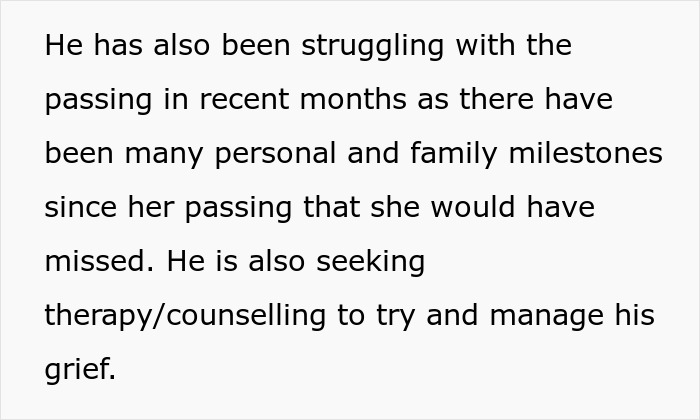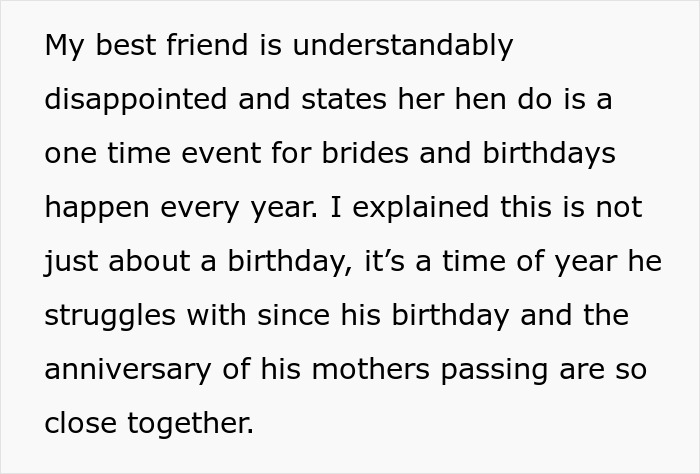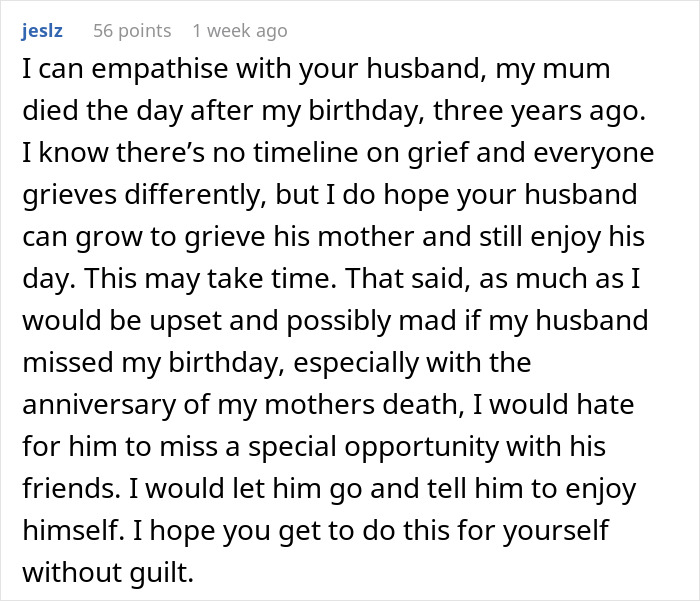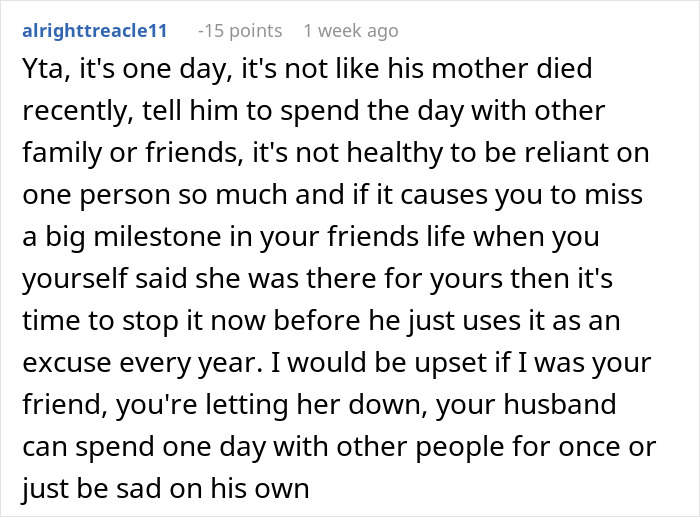Everyone grieves differently and there’s no ‘timeline’ for when you should stop, but it’s appreciated if your nearest and dearest are there for you. What you can do—as a partner, friend, or relative—is support your loved one in whatever way they need during this tough time. That support can mean hearing the other person out, going for a long walk together, cooking a wholesome meal, just sitting together silently, or commemorating important anniversaries.
You give your loved one what they need. However, not everyone in your social circle might understand this. Redditor u/madbutmagic_ asked the AITA online community for help regarding a sensitive issue. She shared how she’s considering skipping a part of her best friend’s bachelorette party, which is abroad, to spend time with her husband on his birthday, which is also the anniversary of his mother passing away.
You’ll find the full story and the advice everyone gave the woman below. Bored Panda has reached out to the author, and we’ll update the article as soon as we hear back from her.
Spending quality time with your friends during their important life moments shows that you care about them, but sometimes there are other priorities

Image credits: tabitha turner (not the actual photo)
One woman asked the net for advice, as she’s looking for a compromise between supporting her still-grieving husband and her bride-to-be best friend












Image credits: Milles Studio (not the actual photo)


Image source: madbutmagic_
There is no ‘right’ or ‘wrong’ way to grieve. People react differently and need different types of support
Most internet users were very supportive of the woman’s decision to fly back from her friend’s bachelorette party early so that she could be with her husband on his birthday, which for him is mingled with the grief of having lost his mother around that time.
There is no ‘set’ framework or timeline for how to grieve. Everyone really does grieve differently. When tragedy strikes, one person might want to be mostly left alone while someone else chooses to be constantly surrounded by family and friends.
One individual might want to talk about the loved one they lost to remember them, while for someone else, that grief is still too near, and they can’t bring themselves to do it. There is no ‘right’ or ‘wrong’ way to grieve.
A psychotherapist previously shed some light on this topic for Bored Panda. According to the mental health expert, some people grieve “with lots of crying” while others do so “with being practical.”
Just because you don’t see any tears shining on someone’s face doesn’t mean that they aren’t in pain or they’re not grieving. The entire grieving process lasts “as long as it needs to.” There is no time limit.
Broadly speaking, grief does diminish over time, and those grieving become less upset. That being said, some individuals may never recover from grief and may need to reach out to a mental health specialist specializing in these situations for support.
Most people learn to live with grief and sadness, the mental health specialist said. “Significant dates, such as anniversaries, may always be painful,” he noted.
According to the psychotherapist, many people don’t follow the so-called ‘stages of grief’ (denial, anger, bargaining, depression, and acceptance).
It’s important to continue supporting the person years after their loss, not just at the start
Grief, at its core, can be “messy and unpredictable.” Just sitting with the person, giving them a hug, or actively listening to them if they want to talk is enough. Though, sometimes, they might want a distraction, so come up with ideas to get them out of the house.
The mental health specialist warned that something you should probably avoid doing is telling someone that you know how they feel exactly because grief is so unique.
Another thing to keep in mind is that many people tend to support those in grief at the beginning, but they don’t continue that support once some time has passed. Real support lasts a long time and doesn’t fizzle out.
You should not feel uncomfortable about asking your partner, relative, or friend about how they feel even years later. Give them a chance to speak and open up about how they’re really doing.
Meanwhile, during a previous interview with Bored Panda, an internet user who had lost her husband opened up about how best to support someone who is grieving. She urged people not to repeat empty platitudes. Nor should you encourage them to ‘move on.’ What you can do is try to include the person in your life and share good memories of those who have passed.
“Do not utter all those platitudes about the dead person being in a better place, that their suffering is done, that they’re with Jesus now (you don’t know what their beliefs were or not), etc. Sometimes, what we need is for those who would comfort us to simply be with us. Sit with us. Pass the tissue box. Hold our hand. And be silent. And that is hard, but it is infinitely kinder than hearing some trite platitude,” the woman shared.
“Do generously share your memories of your friendship, relationship, work anecdotes, etc., of the dead person and not only in the days or weeks after they’ve died, but in the months and years that follow,” she said.
After the woman shared the post online, many readers came out in support and shared some advice with her
























Some internet users shared similar stories of their own

A handful of people were less than empathetic and didn’t see the subtle issue. Here’s how they saw the situation


The post Bride Furious BFF Left Her Hen Party Early To Support Grieving Husband first appeared on Bored Panda.
from Bored Panda https://ift.tt/vJti7h9
via IFTTT source site : boredpanda